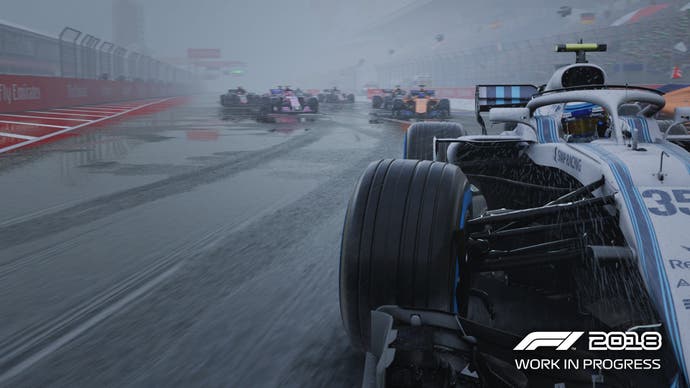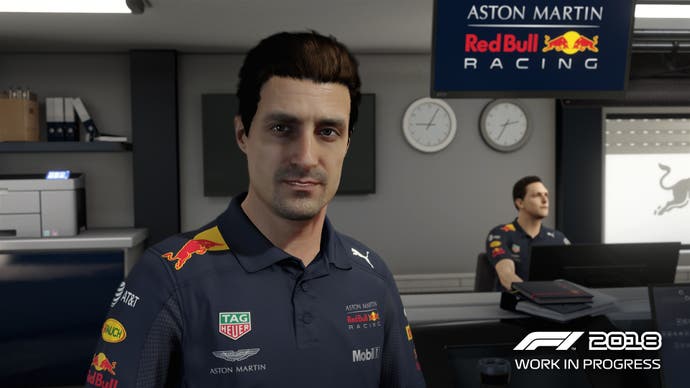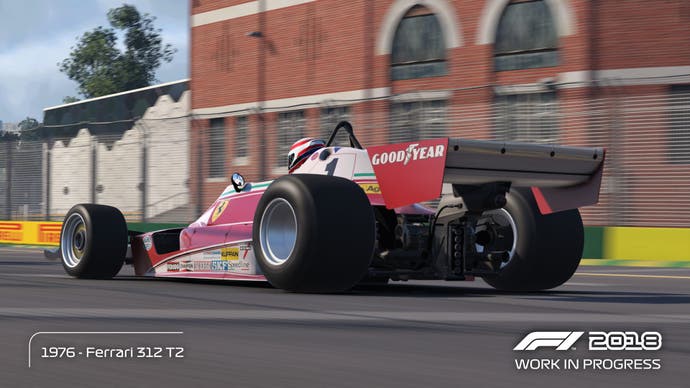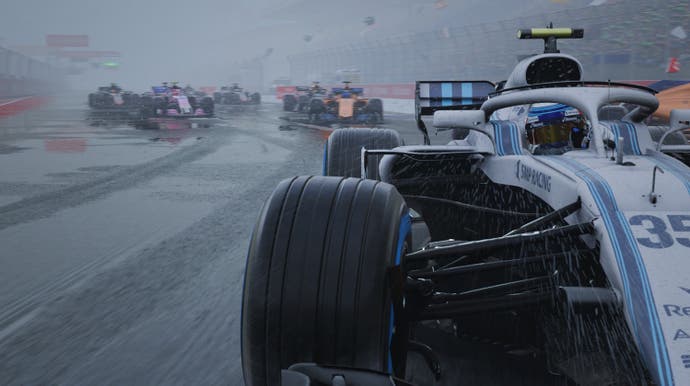The F1 series now has the best career mode in racing games
But how much new can F1 2018 offer?
It's been a long time since I've played a Formula One game, and in truth I've seldom enjoyed them that much - which, as a fan of both racing games and the sport, seemed a shame. There was something alienating, I found, in the monotonously fast machinery with its nervy handling and in the dry pageantry of the licence. The championship season was the main hook, but it was exhaustingly long and, without the variety and sense of progression offered by broader racing games, its payoff seemed distant.
So it was without much expectation that I covered for our regular F1 correspondent Martin at a recent preview event for this year's F1 game from Codemasters, F1 2018. Yet what I found there was, on the basis of a couple of hours' play, the most immediately involving and cleverly designed career mode in any current racing game.
This may not be news to people who've stayed in touch with the series. Since it made a bare-bones reboot on the current consoles in F1 2015, Codemasters has been progressively beefing up F1's career offering. Actual new features in F1 2018 are relatively few: I've listed them below, but the headline addition is that of media interviews, which present you with multiple choice answers and affect your driver's reputation in the paddock, the morale of your team and your position in the contract market.

Iterative and incremental as it is, the work of Codemasters' developers has been easy to ignore from the outside. Coming to the series after a long hiatus, though, I was impressed by how what they have built is faithful both to the deep, nerdy detail of the sport and to the structural requirements of a strong single-player video game. In fact, these two things harmonise surprisingly well. Take tech trees as an example. As you play the game and get laps in the car under your belt, you accrue points - essentially XP - which can be spent in an R&D tech tree to develop upgrades for your car that will drop later in the season. This is both a sound game mechanic in its own right, such as you might find in an RPG or 4X strategy game, and a pretty decent metaphor for the work drivers and engineers do together across an F1 season to try to keep up with the rapidly developing pack.
Even better are the practice programmes. These are mini-games that you play during the practice sessions of a race weekend, and they do nothing less than transform the focus and rhythm of single-player racing. A Formula One race weekend is comprised of three practice sessions, a qualifying session and the race itself. Practice sessions are a good opportunity to familiarise yourself with a circuit and whittle down your lap times, but in most games they consist of nothing but lapping. The F1 games' practice programmes encourage you to focus on several different aspects of the discipline - tyre management, fuel management, the optimal racing line, race strategy and so on - in three-lap chunks, rewarding you with R&D points if you're successful. You're learning the track and the complexities of F1 racing as you go, and the programmes are fun challenges in their own right. If you do all of them, you will spend more time practicing than racing: the practice programmes create a fulfilling, RPG-style rhythm to each race weekend, whereby the practice sessions play the role of the grindy quests and the the race is the dungeon or boss fight. Punctuated and built up like this, the races feel more exhilarating and less exhausting.

Connecting these and other elements is a complex - perhaps too complex - web of systems that maps out your career progress. You are not just racing and managing R&D, but ranking up as a driver, working on your reputation within the team and the wider paddock, negotiating contracts and measuring yourself against rival drivers. There's a lot to do and think about - certainly more than in any other racing game out there. I'm excited to give a full season a go.
Should you still be excited if, unlike me, you've been playing the F1 games religiously these past few years? That's not so easy to answer. F1 2018 seems to be a solid but iterative instalment in search of an interesting hook. Aside from the rather clunky media interviews, the new R&D and contract negotiation systems should give enthusiasts of the byzantine backroom complexity of Formula One the most to chew on, though that doesn't sound like much of an enticement to play through a whole new season. Here's a breakdown of what's new:

- Meet the media: In these woodenly voiced and animated interviews, you have to pick responses to a journalist's questions under time pressure, and your answers will decide whether you are known for your "sportsmanship" (deference to the team, respect for rivals, willingness to accept blame) or "showmanship" (being an entitled, spoiled prick who is never at fault, in true F1 style). They play into longer-term career goals, especially the contract market, but they're not much fun in themselves.
- New and returning circuits: Following the 2018 F1 calendar means we get a rare opportunity to see Circuit Paul Ricard from southern France in a game, as well as a welcome return for Germany's Hockenheimring.
- R&D changes: Upgrades now come quicker and at lower cost than in F1 2017, so players will see more of the tech tree. In another nod to the real-life complications of this most bureaucratic and technocratic of sports, you'll receive warnings of upcoming rule changes that will mix up the team performance order, and can spend your R&D points to protect some of your upgrades into the following season.
- New driver rivalry system: Previously, your performance was automatically measured against that of your team-mate. While your team-mate is still your default rival at the start of the game, you later get the option to select a rival from elsewhere on the grid and effectively bet your reputation on the rivalry, gaining standing in the paddock if you beat him and losing it if you don't. Think you can take Vettel on? (I did, and he nailed me on the very last corner of Albert Park.)
- Contract negotiation changes: At four points during the season you're offered the opportunity to either renegotiate your contract with your present team or negotiate with a new team. You can promise results, set conditions such as whether you're willing to be second driver, and set expectations of your own, such as improvements to pit efficiency or upgrade speed. If the team you're after doesn't think you have the rep or results to match the deal, you can trade it down or look to match it lower down the grid.
- Handling: The suspension and chassis sim now updates faster (at 1000Hz), which Codemasters says gives a better, more relatable feeling to the supernatural grip of F1 cars. I can't compare it, but the game did feel surprisingly driveable to me playing on an Xbox pad. The ERS electric power system is now included and can be managed manually, though there's an assist for less experienced players.
- Halo: The unlovely new protective devices are included, of course, though when playing in cockpit cam you can remove the centre strut which makes visibility very difficult. I found the TV-style camera positioned above the driver's head provided the best view.
- New classic cars: There are eight new vintage F1 cars, bringing the roster to 20. Additions include Niki Lauda's 1976 Ferrari 312 T2 and the 2009 championship-winning Brawn BGP 001, the first and only Brawn GP car.
- Ranked multiplayer with skill and safety ratings: Codemasters is following the lead established by iRacing and, more recently, Gran Turismo Sport by attempting to establish a fair and clean online racing environment. A new super licence system for ranked multiplayer will take skill and safety ratings into account, along with a driver's experience level, feeding all these into an Elo matchmaking system.
That last point could well make the biggest difference to the Codemasters F1 community, but there's no way to judge its success yet. There'll be a beta soon. Otherwise, this may not sound like the most thrilling of updates and Codemasters still has something to prove on bugginess, but there's no doubt that F1 2018 promises a deep and extensive single-player racing experience you simply can't find anywhere else. It's out on 24th August.


